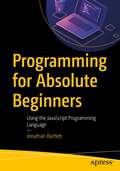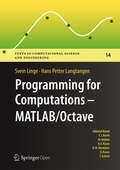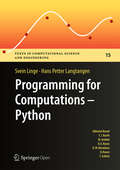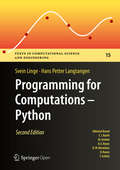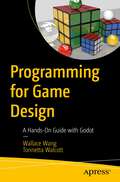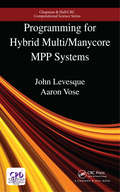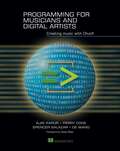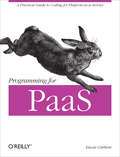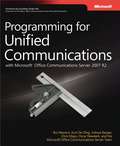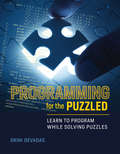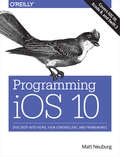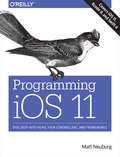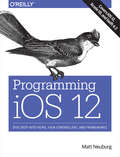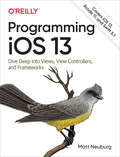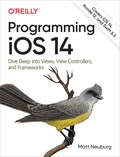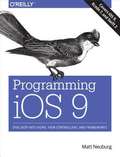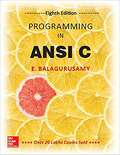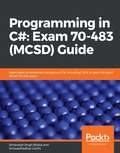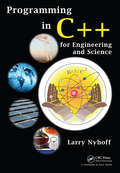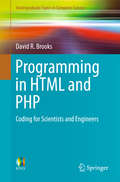- Table View
- List View
Programming for Absolute Beginners: Using the JavaScript Programming Language
by Jonathan BartlettNew programmers start here...this book introduces students or aspiring professionals to the world of computer programming using JavaScript and related technologies. This book doesn't just teach the basics of programming, but also all of the tools that new programmers need to get started, including the basics of making web pages and how the Internet works. Programming for Absolute Beginners offers practice problems, activities, and a host of resources to get new programmers started, plus a large glossary of terms introduced in the book and that a new programmer might encounter when learning on their own. No special software is required; this book will help you regardless of what your computer setup is, and source code will be freely available via GitHub.What You Will LearnHow computers workHow computers communicate over networksHow web pages are built with HTML and CSSHow JavaScript worksHow JavaScript interacts with web pagesIntermediate JavaScript topics such as recursion and scopingUsing JavaScript for network communication Who This Book Is ForAnyone wanting to begin computer programming, including students who need to learn the fundamentals and early professionals who want to go back and revisit the basics.
Programming for Computations - MATLAB/Octave
by Svein Linge Hans Petter LangtangenThis book presentscomputer programming as a keymethod for solving mathematical problems. There are two versions of the book,one for MATLAB and onefor Python. The book wasinspired by the Springer bookTCSE 6: A Primer on Scientific Programming with Python (by Langtangen), but the style is more accessible andconcise, in keeping with the needs of engineering students. The book outlines the shortest possible path from no previous experience with programming to a set ofskills that allows the students to write simple programs for solving commonmathematical problems withnumerical methods in engineering and science courses. The emphasis is on generic algorithms, cleandesign of programs, use of functions, and automatic tests for verification.
Programming for Computations - Python
by Svein Linge Hans Petter LangtangenThis book presentscomputer programming as a keymethod for solving mathematical problems. There are two versions of the book,one for MATLAB and onefor Python. The book wasinspired by the Springer bookTCSE 6: A Primer on Scientific Programming with Python (by Langtangen), but the style is more accessible andconcise, in keeping with the needs of engineering students. The book outlines the shortest possible path from no previous experience with programming to a set ofskills that allows the students to write simple programs for solving commonmathematical problems withnumerical methods in engineering and science courses. The emphasis is on generic algorithms, cleandesign of programs, use of functions, and automatic tests for verification.
Programming for Computations - Python: A Gentle Introduction to Numerical Simulations with Python 3.6 (Texts in Computational Science and Engineering #15)
by Svein Linge Hans Petter LangtangenThis book is published open access under a CC BY 4.0 license. This book presents computer programming as a key method for solving mathematical problems. This second edition of the well-received book has been extensively revised: All code is now written in Python version 3.6 (no longer version 2.7). In addition, the two first chapters of the previous edition have been extended and split up into five new chapters, thus expanding the introduction to programming from 50 to 150 pages. Throughout the book, the explanations provided are now more detailed, previous examples have been modified, and new sections, examples and exercises have been added. Also, a number of small errors have been corrected. The book was inspired by the Springer book TCSE 6: A Primer on Scientific Programming with Python (by Langtangen), but the style employed is more accessible and concise, in keeping with the needs of engineering students. The book outlines the shortest possible path from no previous experience with programming to a set of skills that allows students to write simple programs for solving common mathematical problems with numerical methods in the context of engineering and science courses. The emphasis is on generic algorithms, clean program design, the use of functions, and automatic tests for verification.
Programming for Game Design: A Hands-On Guide with Godot
by Wallace Wang Tonnetta WalcottCreate video game elements using the Godot game engine, gaining practical experience in programming and video game development. The Godot game engine uses a simplified programming language called GDScript, which closely resembles Python. By learning GDScript, you can focus more on learning the basics of programming. You’ll explore concepts such as variables and data structures variables used to store information about video game objects that can be manipulated using a keyboard or a mouse. You’ll also learn about user interface design, branching statements, and looping statements, enabling you to actively engage in programming and create your own interactive games. By the end of the book, you’ll have a solid understanding of how video game elements work and how the basic principles of programming work as well. By programming simple video game elements in the Godot game engine, you’ll learn both programming and the principles of 2D video game design.What You Will LearnUnderstand the basics of programming by creating simple video game elements in the Godot game engine.Explore variables and data structures to actively store and modify information about video game objects.Gain a deeper understanding of user interface design.Master simplified programming languages like GDScript.Who This Book Is For Aspiring programmers and game enthusiasts seeking an engaging introduction to programming through video game creation.
Programming for Hybrid Multi/Manycore MPP Systems (Chapman & Hall/CRC Computational Science)
by John Levesque Aaron Vose"Ask not what your compiler can do for you, ask what you can do for your compiler."--John Levesque, Director of Cray’s Supercomputing Centers of Excellence <P><P>The next decade of computationally intense computing lies with more powerful multi/manycore nodes where processors share a large memory space. These nodes will be the building block for systems that range from a single node workstation up to systems approaching the exaflop regime. The node itself will consist of 10’s to 100’s of MIMD (multiple instruction, multiple data) processing units with SIMD (single instruction, multiple data) parallel instructions. Since a standard, affordable memory architecture will not be able to supply the bandwidth required by these cores, new memory organizations will be introduced. These new node architectures will represent a significant challenge to application developers. <P><P>Programming for Hybrid Multi/Manycore MPP Systems attempts to briefly describe the current state-of-the-art in programming these systems, and proposes an approach for developing a performance-portable application that can effectively utilize all of these systems from a single application. The book starts with a strategy for optimizing an application for multi/manycore architectures. It then looks at the three typical architectures, covering their advantages and disadvantages. <P><P>The next section of the book explores the other important component of the target—the compiler. The compiler will ultimately convert the input language to executable code on the target, and the book explores how to make the compiler do what we want. The book then talks about gathering runtime statistics from running the application on the important problem sets previously discussed. <P><P>How best to utilize available memory bandwidth and virtualization is covered next, along with hybridization of a program. The last part of the book includes several major applications, and examines future hardware advancements and how the application developer may prepare for those advancements.
Programming for Musicians and Digital Artists: Creating music with ChucK
by Ge Wang Spencer Salazar Ajay Kapur Perry CookSummaryProgramming for Musicians and Digital Artists: Creating Music with ChucK offers a complete introduction to programming in the open source music language ChucK. In it, you'll learn the basics of digital sound creation and manipulation while you discover the ChucK language. As you move example-by-example through this easy-to-follow book, you'll create meaningful and rewarding digital compositions and "instruments" that make sound and music in direct response to program logic, scores, gestures, and other systems connected via MIDI or the network.Purchase of the print book includes a free eBook in PDF, Kindle, and ePub formats from Manning Publications.About this BookA digital musician must manipulate sound precisely. ChucK is an audio-centric programming language that provides precise control over time, audio computation, and user interface elements like track pads and joysticks. Because it uses the vocabulary of sound, ChucK is easy to learn even for artists with little or no exposure to computer programming.Programming for Musicians and Digital Artists offers a complete introduction to music programming. In it, you'll learn the basics of digital sound manipulation while you learn to program using ChucK. Example-by-example, you'll create meaningful digital compositions and "instruments" that respond to program logic, scores, gestures, and other systems connected via MIDI or the network. You'll also experience how ChucK enables the on-the-fly musical improvisation practiced by communities of "live music coders" around the world.Written for readers familiar with the vocabulary of sound and music. No experience with computer programming is required.What's InsideLearn ChucK and digital music creation side-by-sideInvent new sounds, instruments, and modes of performanceWritten by the creators of the ChucK languageAbout the AuthorsPerry Cook, Ajay Kapur, Spencer Salazar, and Ge Wang are pioneers in the area of teaching and programming digital music. Ge is the creator and chief architect of the ChucK language.Table of ContentsIntroduction: ChucK programming for artistsPART 1 INTRODUCTION TO PROGRAMMING IN CHUCKBasics: sound, waves, and ChucK programmingLibraries: ChucK's built-in toolsArrays: arranging and accessing your compositional dataSound files and sound manipulationFunctions: making your own toolsPART 2 NOW IT GETS REALLY INTERESTING!Unit generators: ChucK objects for sound synthesis and processingSynthesis ToolKit instrumentsMultithreading and concurrency: running many programs at onceObjects and classes: making your own ChucK power toolsEvents: signaling between shreds and syncing to the outside worldIntegrating with other systems via MIDI, OSC, serial, and more
Programming for PaaS: A Practical Guide to Coding for Platform-as-a-Service
by Lucas CarlsonPlatform-as-a-Service (PaaS) is gaining serious traction among web and mobile developers, but as new PaaS providers emerge and existing vendors upgrade their features, it’s hard to keep track of what PaaS has to offer. This thorough introduction takes you through the PaaS model from a developer’s point of view, and breaks down the types of services that Google App Engine, Windows Azure, Heroku, Cloud Foundry, and others deliver.Whether you’re an entrepreneur or part of a large enterprise development team, this book shows you how PaaS can help you focus on innovative applications, rather than spend your time worrying about technical operations.Track the cloud’s evolution from IaaS and DevOps to PaaSLearn how PaaS combines the simplicity of shared web hosting with the control of dedicated hostingExplore the benefits of both portable and non-portable PaaS optionsApply best practices for moving legacy apps to PaaS—and understand the challenges involvedWrite new applications for PaaS from scratch with RESTful meta-servicesUse PaaS to build mobile apps with backend services that scaleExamine the core services that each major provider currently offersLearn the situations in which PaaS might not be advantageous
Programming for Unified Communications with Microsoft® Office Communications Server 2007 R2
by Chris Mayo Kurt De Ding Oscar Newkerk Rui Maximo Vishwa RanjanDirect from the Microsoft Office Communications Server product team, get the hands-on guidance you need to streamline your organization's real-time, remote communication and collaboration solutions across the enterprise and across time zones.
Programming for Unified Communications with Microsoft® Office Communications Server 2007 R2
by Chris Mayo Kurt De Ding Oscar Newkerk Rui Maximo Vishwa Ranjan Microsoft Communications Server TeamExploit the Unified Communications (UC) platform's rich and open API set--and create your own real-time communication solutions faster. Led by a team of UC programming experts, you'll get the code walkthroughs and pragmatic advice you need to seamlessly integrate enterprise IM, presence, VoIP, and conferencing into your applications now. Connect users exactly how and when they want--and increase business agility Examine the architecture, design model, and scenarios for each API--matching the right functionality to your needs Automate Office Communicator features--sign-in, contacts, presence, conversations Use contextual collaboration to send and receive application-specific messages between clients Develop Windows Workflow applications that support both voice and IM Create and provision custom presence applications Build server-side applications that maximize throughput and enable multiparty conferencing Prepare your application for deployment Apply best practices for debugging and troubleshootingProgramming for Unified Communications with Microsoft® Office Communications Server 2007 R2
Programming for the Puzzled: Learn to Program While Solving Puzzles (The\mit Press Ser.)
by Srini DevadasLearning programming with one of “the coolest applications around”: algorithmic puzzles ranging from scheduling selfie time to verifying the six degrees of separation hypothesis.This book builds a bridge between the recreational world of algorithmic puzzles (puzzles that can be solved by algorithms) and the pragmatic world of computer programming, teaching readers to program while solving puzzles. Few introductory students want to program for programming's sake. Puzzles are real-world applications that are attention grabbing, intriguing, and easy to describe. Each lesson starts with the description of a puzzle. After a failed attempt or two at solving the puzzle, the reader arrives at an Aha! moment—a search strategy, data structure, or mathematical fact—and the solution presents itself. The solution to the puzzle becomes the specification of the code to be written. Readers will thus know what the code is supposed to do before seeing the code itself. This represents a pedagogical philosophy that decouples understanding the functionality of the code from understanding programming language syntax and semantics. Python syntax and semantics required to understand the code are explained as needed for each puzzle.Readers need only the rudimentary grasp of programming concepts that can be obtained from introductory or AP computer science classes in high school. The book includes more than twenty puzzles and more than seventy programming exercises that vary in difficulty. Many of the puzzles are well known and have appeared in publications and on websites in many variations. They range from scheduling selfie time with celebrities to solving Sudoku problems in seconds to verifying the six degrees of separation hypothesis. The code for selected puzzle solutions is downloadable from the book's website; the code for all puzzle solutions is available to instructors.
Programming iOS 10: Dive Deep into Views, View Controllers, and Frameworks
by Matt NeuburgIf you're grounded in the basics of Swift, Xcode, and the Cocoa framework, this book provides a structured explanation of all essential real-world iOS app components. Through deep exploration and copious code examples, you'll learn how to create views, manipulate view controllers, and add features from iOS frameworks.Stay up-to-date on iOS 10 innovations, such as property animators, force touch, speech recognition, and the User Notification framework, as well as Xcode 8 improvements for autolayout and asset catalogs. All example code (now rewritten in Swift 3) is available on GitHub for you to download, study, and run.Create, arrange, draw, layer, and animate views that respond to touchUse view controllers to manage multiple screens of interfaceMaster interface classes for scroll views, table views, text, popovers, split views, web views, and controlsDive into frameworks for sound, video, maps, and sensorsAccess user libraries: music, photos, contacts, and calendarExplore additional topics, including files, networking, and threadsWant to brush up on the basics? Pick up iOS 10 Programming Fundamentals with Swift (978-1-491-97007-2) to learn about Swift, Xcode, and Cocoa. Together with Programming iOS 10, you'll gain a solid, rigorous, and practical understanding of iOS 10 development.
Programming iOS 11: Dive Deep into Views, View Controllers, and Frameworks
by Matt NeuburgIf you’re grounded in the basics of Swift, Xcode, and the Cocoa framework, this book provides a structured explanation of all essential real-world iOS app components. Through deep exploration and copious code examples, you’ll learn how to create views, manipulate view controllers, and add features from iOS frameworks.Create, arrange, draw, layer, and animate views that respond to touchUse view controllers to manage multiple screens of interfaceMaster interface classes for scroll views, table views, text, popovers, split views, web views, and controlsDive into frameworks for sound, video, maps, and sensorsAccess user libraries: music, photos, contacts, and calendarExplore additional topics, including files, networking, and threadsStay up-to-date on iOS 11 innovations, such as:Drag and dropAutolayout changes (including the new safe area)Stretchable navigation barsTable cell swipe buttonsDynamic type improvementsOffline sound file rendering, image picker controller changes, new map annotation types, and moreAll example code (now rewritten in Swift 4) is available on GitHub for you to download, study, and run.Want to brush up on the basics? Pick up iOS 11 Programming Fundamentals with Swift to learn about Swift, Xcode, and Cocoa. Together with Programming iOS 11, you’ll gain a solid, rigorous, and practical understanding of iOS 11 development.
Programming iOS 12: Dive Deep into Views, View Controllers, and Frameworks
by Matt NeuburgIf you’re grounded in the basics of Swift, Xcode, and the Cocoa framework, this book provides a structured explanation of all essential real-world iOS app components. Through deep exploration and copious code examples, you’ll learn how to create views, manipulate view controllers, and add features from iOS frameworks.Create, arrange, draw, layer, and animate views that respond to touchUse view controllers to manage multiple screens of interfaceMaster interface classes for scroll views, table views, text, popovers, split views, web views, and controlsDive into frameworks for sound, video, maps, and sensorsAccess user libraries: music, photos, contacts, and calendarExplore additional topics, including files, networking, and threadsStay up-to-date on iOS 12 innovations, such as User Notification framework improvements, as well as changes in Xcode 10 and Swift 4.2. All example code is available on GitHub for you to download, study, and run.Want to brush up on the basics? Pick up iOS 12 Programming Fundamentals with Swift to learn about Swift, Xcode, and Cocoa. Together with Programming iOS 12, you’ll gain a solid, rigorous, and practical understanding of iOS 12 development.
Programming iOS 13: Dive Deep into Views, View Controllers, and Frameworks
by Matt NeuburgIf you’re grounded in the basics of Swift, Xcode, and the Cocoa framework, this book provides a structured explanation of all essential real-world iOS app components. Through deep exploration and copious code examples, you’ll learn how to create views, manipulate view controllers, and add features from iOS frameworks.Create, arrange, draw, layer, and animate views that respondto touchUse view controllers to manage multiple screens of interfaceMaster interface classes for scroll views, table views, text,popovers, split views, web views, and controlsDive into frameworks for sound, video, maps, and sensorsAccess user libraries: music, photos, contacts, and calendarExplore files, networking, and threadsStay up-to-date on iOS 13 innovations, such as:Symbol imagesLight and dark modeSheet presentationDiffable data sources and compositional layoutContext menus and previewsWindow scene delegates and multiple windows on iPadWant to brush up on the basics? Pick up iOS 13 Programming Fundamentals with Swiftto learn about Swift, Xcode, and Cocoa. Together with Programming iOS 13, you’ll gaina solid, rigorous, and practical understanding of iOS 13 development.
Programming iOS 14: Dive Deep Into Views, View Controllers, And Frameworks
by Matt NeuburgIf youâ??re grounded in the basics of Swift, Xcode, and the Cocoa framework, this book provides a structured explanation of all essential real-world iOS app components. Through deep exploration and copious code examples, youâ??ll learn how to create views, manipulate view controllers, and add features from iOS frameworks.Create, arrange, draw, layer, and animate views that respond to touchUse view controllers to manage multiple screens of interfaceMaster interface classes for scroll views, table views, collection views, text, popovers, split views, web views, and controlsDive into frameworks for sound, video, maps, and sensorsAccess user libraries: music, photos, contacts, and calendarExplore additional topics, including files, networking, and threadsStay up-to-date on iOS 14 innovations, such as:Control action closures and menusTable view cell configuration objectsCollection view lists and outlinesNew split view controller architecturePointer customization on iPadNew photo picker and limited photos authorizationReduced accuracy locationColor picker, new page control behavior, revised date pickers, and more!Want to brush up on the basics? Pick up iOS 14 Programming Fundamentals with Swift to learn about Swift, Xcode, and Cocoa. Together with Programming iOS 14, youâ??ll gain a solid, rigorous, and practical understanding of iOS 14 development.
Programming iOS 5
by Matt NeuburgGet a solid grounding in the fundamentals of Cocoa Touch, and avoid problems during iPhone and iPad app development. With this revised and expanded edition, you'll dig into Cocoa and learn how to work effectively with Objective-C and Xcode. This book covers iOS 5 and Xcode 4.3 in a rigorous, orderly fashion--ideal whether you're approaching iOS for the first time or need a reference to bolster existing skills. Many discussions have been expanded or improved. All code examples have been revised, and many new code examples have been added. The new memory management system--ARC--is thoroughly explained and all code examples have been revised to use it. New Objective-C features, such as declaration of instance variables in the class's implementation section, are described and incorporated into the revised example code. Discussion of how an app launches, and all code examples, are revised for project templates from Xcode 4.2 and later. Other new Xcode features, including the Simulator's Debug menu, are covered, with screen shots based on Xcode 4.2 and later. The discussion of Instruments is expanded, with screen shots--by popular request! Storyboards are explained and discussed. The explanation of view controllers is completely rewritten to include iOS 5 features, such as custom parent view controllers and UIPageViewController. The Controls chapter now includes iOS 5 interface customizability and the appearance proxy. New features of interface classes are discussed, including tiling and animated images, new table view features, new alert view styles. Coverage of frameworks such as Core Motion and AV Foundation is greatly expanded. New iOS 5 classes and frameworks are also discussed, including Core Image and UIDocument (and iCloud support). Important iOS 5 changes that can break existing code are explicitly called out in the text and listed in the index.
Programming in ANSI C
by E. BalagurusamyAccessible textbook of Programming in ANSI C, eighth edition by E. Balagurusamy. A text book with theoretical and practical approach to learning ANSI C programming with examples and exercises. It contains concepts from elementary to advanced level programming covering critical concepts, such as Arrays, Strings, Functions, Pointers, Self-referential Structures, Dynamic Memory Allocation, etc. which makes this book a great reference guide for the beginners as well as advanced learners.
Programming in Ada 2012
by John BarnesAda 2012 is the latest version of the international standard for the programming language Ada. It is designated ISO/IEC 8652:2012 (E) and is a new edition replacing the 2005 version. The primary goals for the new version were to further enhance its capabilities particularly in those areas where its reliability and predictability are of great value. Many important new features have been included such as those defining dynamic contracts and for handling multiprocessors and are integrated within the existing language framework in an elegant and coherent manner. The Ada 2012 Rationale describes not only the changes from Ada 2005 but also the reason for the changes. It starts with an introduction providing a general overview and this is followed by seven chapters focusing on contracts and aspects; extended expressions; structure and visibility; tasking and real time; iterators and pools; predefined library and containers. The book concludes with an epilogue largely concerned with compatibility issues.
Programming in C# (MCSD) Guide: Learn basic to advanced concepts of C#, including C# 8, to pass Microsoft MCSD 70-483 exam
by Simaranjit Singh BhallaThe book is intended to the aspirants of Microsoft certifications and C# developers wanting to become a Microsoft specialist. The book assumes C# knowledge and promises to take it to a practical level.
Programming in C++ for Engineering and Science
by Larry NyhoffDeveloped from the author's many years of teaching computing courses, Programming in C++ for Engineering and Science guides students in designing programs to solve real problems encountered in engineering and scientific applications. These problems include radioactive decay, pollution indexes, digital circuits, differential equations, Internet addr
Programming in HTML and PHP
by David R. BrooksThis concise and accessible textbook will enable readers to quickly develop the working skills necessary to solve computational problems in a server-based environment, using HTML and PHP. The importance of learning by example (as opposed to simply learning by copying) is emphasized through extensive use of hands-on exercises and examples, with a specific focus on useful science and engineering applications. The clearly-written text is designed to be simple to follow for the novice student, without requiring any background in programming or mathematics beyond algebra. Topics and features: describes the creation of HTML pages and the characteristics of HTML documents, showing how to use HTML tables, forms, lists, and frames to organize documents for use with PHP applications; explains how to set up a PHP environment, using a local or remote server; introduces the capabilities and syntax of the PHP language, including coverage of array syntax and use; examines user-defined functions in programming, summarizing PHP functions for reading and writing files, viewing the content of variables, and manipulating strings; reviews the PHP GD graphics library, presenting applications for creating pie charts, bar graphs, and line graphs suitable for displaying scientific data; includes appendices listing HTML and ASCII special characters, and highlighting the essential basic strategies for solving computational problems. Supplying all of the tools necessary to begin coding in HTML and PHP, this invaluable textbook is ideal for undergraduate students taking introductory courses in programming. The book will also serve as a helpful self-study text for professionals in any technical field.
Programming in Haskell
by Graham HuttonHaskell is one of the leading languages for teaching functional programming, enabling students to write simpler and cleaner code, and to learn how to structure and reason about programs. This introduction is ideal for beginners: it requires no previous programming experience and all concepts are explained from first principles via carefully chosen examples. Each chapter includes exercises that range from the straightforward to extended projects, plus suggestions for further reading on more advanced topics. The author is a leading Haskell researcher and instructor, well-known for his teaching skills. The presentation is clear and simple, and benefits from having been refined and class-tested over several years. The result is a text that can be used with courses, or for self-learning. Features include: freely accessible powerpoint slides for each chapter; solutions to exercises, and examination questions (with solutions) available to instructors; downloadable code that's fully compliant with the latest Haskell release.
Programming in Haskell
by Graham HuttonHaskell is a purely functional language that allows programmers to rapidly develop clear, concise, and correct software. The language has grown in popularity in recent years, both in teaching and in industry. This book is based on the author's experience of teaching Haskell for more than twenty years. All concepts are explained from first principles and no programming experience is required, making this book accessible to a broad spectrum of readers. While Part I focuses on basic concepts, Part II introduces the reader to more advanced topics. This new edition has been extensively updated and expanded to include recent and more advanced features of Haskell, new examples and exercises, selected solutions, and freely downloadable lecture slides and example code. The presentation is clean and simple, while also being fully compliant with the latest version of the language, including recent changes concerning applicative, monadic, foldable, and traversable types. This new edition has been extensively revised and expanded, including four new chapters as well as many new examples and exercises. Fully compliant with the latest version of Haskell, and updated to include more recent features. An accompanying website provides a range of supporting materials, including PowerPoint slides and Haskell code for the extended examples. <P><P><i>Advisory: Bookshare has learned that this book offers only partial accessibility. We have kept it in the collection because it is useful for some of our members. To explore further access options with us, please contact us through the Book Quality link on the right sidebar. Benetech is actively working on projects to improve accessibility issues such as these.</i>
Programming in Haskell
by Graham HuttonHaskell is a purely functional language that allows programmers to rapidly develop clear, concise, and correct software. The language has grown in popularity in recent years, both in teaching and in industry. This book is based on the author's experience of teaching Haskell for more than twenty years. All concepts are explained from first principles and no programming experience is required, making this book accessible to a broad spectrum of readers. While Part I focuses on basic concepts, Part II introduces the reader to more advanced topics. This new edition has been extensively updated and expanded to include recent and more advanced features of Haskell, new examples and exercises, selected solutions, and freely downloadable lecture slides and example code. The presentation is clean and simple, while also being fully compliant with the latest version of the language, including recent changes concerning applicative, monadic, foldable, and traversable types.
